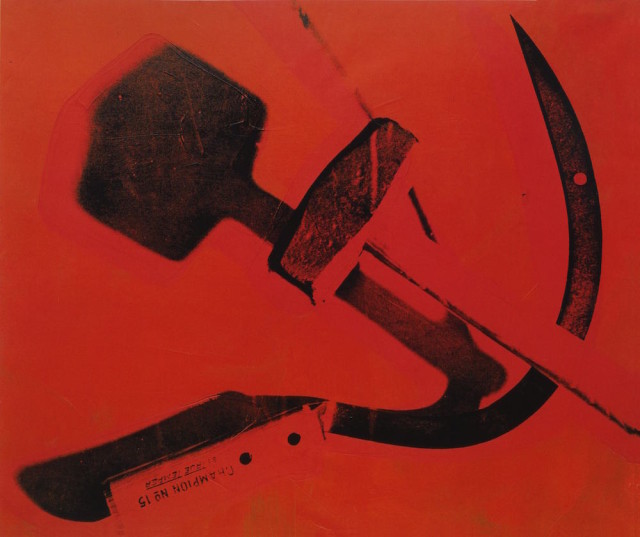Art & Exhibitions
At Skarstedt, Andy Warhol’s Portrait of his Parents?
THE DAILY PIC: Instead of giving us an icon, he offers the reality behind one.

THE DAILY PIC: Instead of giving us an icon, he offers the reality behind one.

Blake Gopnik


THE DAILY PIC (#1419): Warhol made this Hammer & Sickle painting in 1976, and it’s now in a show of his late works at Skarstedt gallery in New York. You could call it an anti-Warhol, at least in terms of how it flips the clichés usually spouted about him. (That actually makes it the archetypal Warhol, since he was always resisting the expected.) Warhol was supposed to be all about distilling the most telling icons out of what passes for our reality, and re-presenting them to us as image. Here, however he takes something that only really has a presence as icon and gives us an image of the reality behind it.
Warhol doesn’t offer us a Hammer & Sickle. He offers us a hammer, and a sickle, as sold at a hardware store for actual use by non-Superstars. The hammer is the kind of tool his father Andrej and his crew might have used when they were busy moving office buildings on rollers (often without disturbing the hundreds of workers inside). The sickle is just what his mother Julia would have wielded on her family’s little farm in the Carpathian mountains: “I chopped grass for cow … you want to milk a cow, you have to get something for cow.”
Despite claims that Warhol was an apolitical animal, documents prove that he was and always had been a not-so-closet Lefty. In the Cold War piece on view at Skarstedt Warhol sees that, to be taken seriously, America’s Left Wing had to go back to the principals and compassions that had fueled Communism, and stand back from its rhetorics and manipulations. (©Andy Warhol Foundation for the Visual Arts, Inc./Artists Rights Society (ARS), New York, 2015; courtesy Skarstedt, New York)